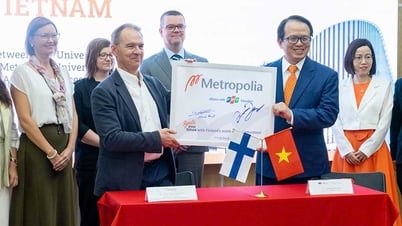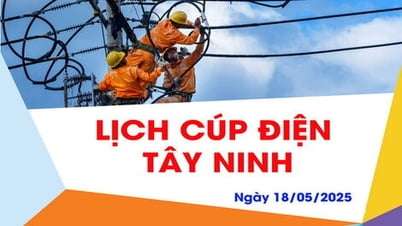Therefore, businesses hope that this amendment to Law 69 will inherit the innovation of the Petroleum Law, strengthen decentralization and strongly delegate power to corporations and general companies, so that businesses can be more proactive in their investment decisions.
Mr. Hoang Xuan Duong - Deputy General Director of the Oil and Gas Exploration and Production Corporation (PVEP) said: "With faster approval, the following stages will also be accelerated. From bid approval, approval of implementation steps. Currently, there are projects where we have shortened the implementation time by about 1 year, bringing efficiency to the State of millions of USD on a project scale".
The draft Law on Management and Investment of State Capital in Enterprises has "unleashed" and decentralized much more strongly than specialized laws. Because the agency representing the capital owner only decides on investment projects of enterprises with state capital investing over 50% of charter capital, belonging to Group A according to the provisions of the Law on Public Investment. The rest is all assigned to the enterprise responsible for investment decisions.
With such a strong spirit of decentralization and delegation of power, if the draft law is passed, it will create a legal corridor to remove bottlenecks and free up resources for state-owned enterprises. When the State only plays the role of an investor and does not deeply interfere in the operations of enterprises, it will help enterprises quickly take advantage of business opportunities.
"We at PVN have many overseas investment activities. I also hope that the new law will have regulations to decentralize the decision-making process for businesses to invest abroad, to ensure that these procedures can be shortened and opportunities can be best exploited," said Mr. Nguyen Van Mau - Member of the Board of Directors, Vietnam Oil and Gas Group PVN.
Mr. Dau Anh Tuan - Head of the Legal Department of VCCI said: "The market is different this month, different next month, different this week, different next week, even different this day, different next day, so the business decisions of enterprises must be quick. Therefore, the decisions of the capital management agency and the State must keep up with business decisions. We hope that by amending Law 69 this time, the State will limit its ownership rights equally to other owners, then it can mobilize capital from society."
Currently, Vietnam has about 841 state-owned enterprises. Every year, they contribute nearly 30% of the total taxes and payments to the State Budget. With such huge resources, if they are given the same autonomy and flexibility as private enterprises, state-owned enterprises will become "capital magnets" attracting domestic and foreign investment, worthy of being the "steel fists" of the economy .

Innovation in business evaluation and classification methods
The third "breakthrough" point in the draft is the proposed solution to innovate the method of evaluating the efficiency and classifying enterprises. If the old Law 69 stipulates the classification and evaluation of enterprises based on the following 4 criteria: Implementation of revenue and profit plans, debt payment ability, results of performing tasks assigned by the State and compliance with general legal policies. Enterprises must meet all 4 of these criteria "ten out of ten" to be classified as type A.
During the process of making reports, VTV's reporter team was told by some businesses that the above evaluation criteria were too strict, causing them difficulties. For example, if a business implements 10 projects, 9 of them will be effective, earning thousands of billions of VND. However, if just 1 project loses money, or just 1 small mistake such as being reminded by the financial agency, it will be classified as B, downgraded or not completing the task. Of course, when downgraded, it will immediately affect the reputation of the business as well as the salaries of officers and employees.
To remove this "bottleneck", the new draft law has proposed to innovate and change the method of evaluating and classifying enterprises. Instead of relying only on rigid criteria, according to each project as before, now it will be evaluated according to the overall, comprehensive goals and results of the enterprise. Political tasks that enterprises are assigned not for profit will also be excluded and not evaluated. Even for joint-stock enterprises, only the representative will be evaluated, not the enterprise, so as not to affect enterprises listed on the stock exchange.
With the above "breakthrough" points, it is clear that the draft law is quite open, creating many advantages for businesses. However, to operate effectively, it is necessary to depend on the dynamism of each business. A representative of the Ministry of Finance , the unit in charge of drafting the draft law, said that post-audit measures are needed so that the State's investment capital in businesses is used effectively.
Mr. Bui Tuan Minh - Director of the Department of Enterprise Finance, Ministry of Finance said: "Enterprises must also be ready to improve their apparatus, dare to decide, dare to do, dare to take responsibility in order to implement projects. With this increased decentralization, management agencies must strengthen management and post-inspection work to promptly adjust and handle."
The draft Law on State Capital Management and Investment in Enterprises will be discussed by the National Assembly in groups on the morning of November 24. After 10 years of implementing Law 69, enterprises now want to put on a new, more spacious coat to replace the old, tight coat, so that they can be proactive in production and business, create a breakthrough momentum for development, and truly be the leading birds leading the economy forward in the coming time.
Source: https://doanhnghiepvn.vn/doanh-nhan/nhung-dot-pha-cua-du-thao-luat-quan-ly-va-dau-tu-von-nha-nuoc-tai-doanh-nghiep/20241123102652174


![[Photo] Prime Minister Pham Minh Chinh chairs meeting on science and technology development](https://vphoto.vietnam.vn/thumb/1200x675/vietnam/resource/IMAGE/2025/5/17/ae80dd74c384439789b12013c738a045)


![[Photo] Readers line up to visit the photo exhibition and receive a special publication commemorating the 135th birthday of President Ho Chi Minh at Nhan Dan Newspaper](https://vphoto.vietnam.vn/thumb/1200x675/vietnam/resource/IMAGE/2025/5/17/85b3197fc6bd43e6a9ee4db15101005b)

![[Photo] More than 17,000 candidates participate in the 2025 SPT Competency Assessment Test of Hanoi National University of Education](https://vphoto.vietnam.vn/thumb/1200x675/vietnam/resource/IMAGE/2025/5/17/e538d9a1636c407cbb211b314e6303fd)



























![[Photo] Nearly 3,000 students moved by stories about soldiers](https://vphoto.vietnam.vn/thumb/1200x675/vietnam/resource/IMAGE/2025/5/17/21da57c8241e42438b423eaa37215e0e)








































































Comment (0)